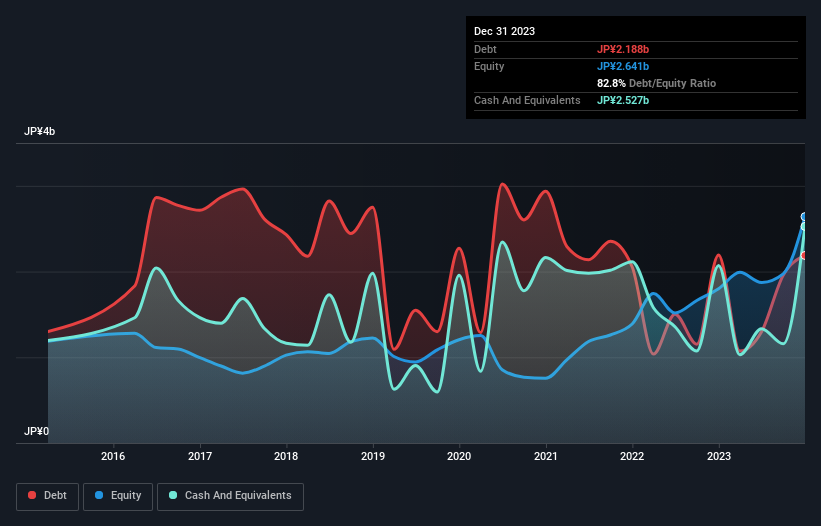
David Iben put it well when he said, 'Volatility is not a risk we care about. What we care about is avoiding the permanent loss of capital.' So it might be obvious that you need to consider debt, when you think about how risky any given stock is, because too much debt can sink a company. We can see that Hakuten Corporation (TSE:2173) does use debt in its business. But should shareholders be worried about its use of debt?
Why Does Debt Bring Risk?
Debt and other liabilities become risky for a business when it cannot easily fulfill those obligations, either with free cash flow or by raising capital at an attractive price. If things get really bad, the lenders can take control of the business. However, a more common (but still painful) scenario is that it has to raise new equity capital at a low price, thus permanently diluting shareholders. Of course, debt can be an important tool in businesses, particularly capital heavy businesses. When we think about a company's use of debt, we first look at cash and debt together.
See our latest analysis for Hakuten
What Is Hakuten's Debt?
As you can see below, Hakuten had JP¥2.19b of debt, at December 2023, which is about the same as the year before. You can click the chart for greater detail. But it also has JP¥2.53b in cash to offset that, meaning it has JP¥339.0m net cash.

A Look At Hakuten's Liabilities
We can see from the most recent balance sheet that Hakuten had liabilities of JP¥3.28b falling due within a year, and liabilities of JP¥1.75b due beyond that. On the other hand, it had cash of JP¥2.53b and JP¥2.63b worth of receivables due within a year. So it can boast JP¥127.0m more liquid assets than total liabilities.
Having regard to Hakuten's size, it seems that its liquid assets are well balanced with its total liabilities. So it's very unlikely that the JP¥10.3b company is short on cash, but still worth keeping an eye on the balance sheet. Simply put, the fact that Hakuten has more cash than debt is arguably a good indication that it can manage its debt safely.
On top of that, Hakuten grew its EBIT by 33% over the last twelve months, and that growth will make it easier to handle its debt. The balance sheet is clearly the area to focus on when you are analysing debt. But it is Hakuten's earnings that will influence how the balance sheet holds up in the future. So if you're keen to discover more about its earnings, it might be worth checking out this graph of its long term earnings trend.
Finally, while the tax-man may adore accounting profits, lenders only accept cold hard cash. While Hakuten has net cash on its balance sheet, it's still worth taking a look at its ability to convert earnings before interest and tax (EBIT) to free cash flow, to help us understand how quickly it is building (or eroding) that cash balance. In the last three years, Hakuten created free cash flow amounting to 8.9% of its EBIT, an uninspiring performance. That limp level of cash conversion undermines its ability to manage and pay down debt.
Summing Up
While it is always sensible to investigate a company's debt, in this case Hakuten has JP¥339.0m in net cash and a decent-looking balance sheet. And it impressed us with its EBIT growth of 33% over the last year. So we don't think Hakuten's use of debt is risky. The balance sheet is clearly the area to focus on when you are analysing debt. But ultimately, every company can contain risks that exist outside of the balance sheet. We've identified 2 warning signs with Hakuten (at least 1 which is potentially serious) , and understanding them should be part of your investment process.
If you're interested in investing in businesses that can grow profits without the burden of debt, then check out this free list of growing businesses that have net cash on the balance sheet.
Valuation is complex, but we're here to simplify it.
Discover if Hakuten might be undervalued or overvalued with our detailed analysis, featuring fair value estimates, potential risks, dividends, insider trades, and its financial condition.
Access Free AnalysisHave feedback on this article? Concerned about the content? Get in touch with us directly. Alternatively, email editorial-team (at) simplywallst.com.
This article by Simply Wall St is general in nature. We provide commentary based on historical data and analyst forecasts only using an unbiased methodology and our articles are not intended to be financial advice. It does not constitute a recommendation to buy or sell any stock, and does not take account of your objectives, or your financial situation. We aim to bring you long-term focused analysis driven by fundamental data. Note that our analysis may not factor in the latest price-sensitive company announcements or qualitative material. Simply Wall St has no position in any stocks mentioned.
About TSE:2173
Hakuten
Provides contact point communications development and marketing solutions in Japan.
Flawless balance sheet with solid track record and pays a dividend.

